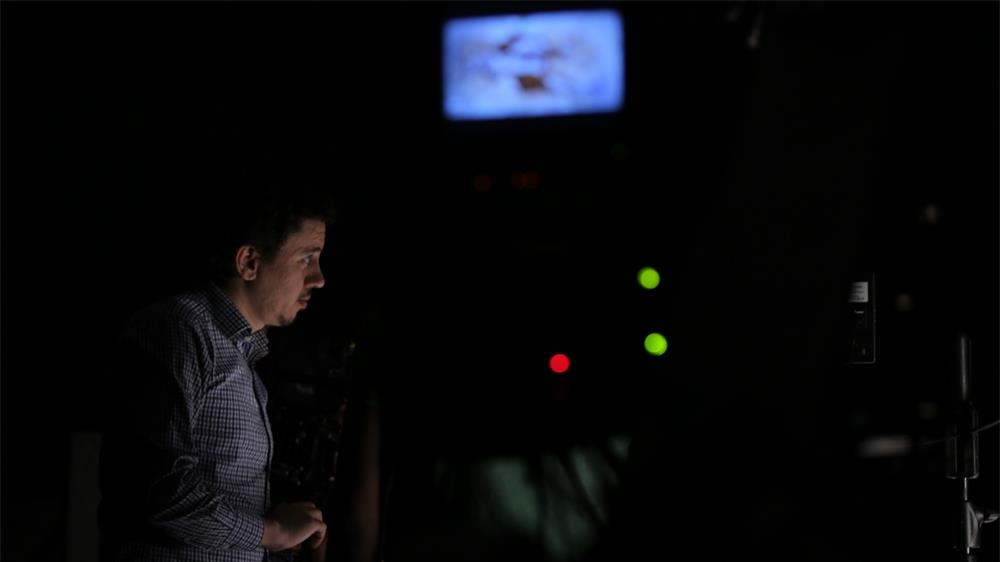الوثائق المكتوبة في الفيلم الاستقصائي لبنة استناد قوية في بنية مسار التحقيق لتدعيم فرضياته، وهي نوعان: الأول، وثائق رسمية، وهي التي تصدر عن مؤسسات وهيئات أو عن أصحاب مناصب رسمية، وتحملُ ختماً وتواقيع العاملين. والثاني، وثائق الأفراد الشخصية كالرسائل والمذكّرات، أو أيّ حيازات ورقيّة شخصيّة لها علاقة بملف التّحقيق. وحتى يتمكَّن الباحث من الوصول إلى هذه الوثائق، عليه في بادئ الأمر دراسة موضوع التحقيق الذي بين يديه جيداً إلى أنْ يصبح خبيراً فيه، ثمّ يحدِّد الوثائق التي يحتاجها في تحقيقه.
من المهم أن يدرك الباحث أن الوثائق ليست شكلاً فنيّاً لتزيين المشهد، فالمُشاهد ذكيٌّ ولديه القدرة على التمييز بين الوثيقة ذات الدليل والأخرى التي يستخدمها المخرج لإضفاء صبغة تحقيقيّة على الفيلم دون أدنى قيمة حقيقيّة للوثيقة المعروضة، لاعتقاد المخرج بأن الوثائق شرط لوصف الفيلم بالاستقصائي، فيسعى بكل الطرق إلى إقحام أي وثائق في فيلمه لظنه أنه أقام بذلك معالجة استقصائيّة في الفيلم، الأمر الذي لا يتفق معه محمد الصعيدي، وهو مخرج ومنتج عدّة أفلام استقصائيّة كان من أبرزها الفيلم الاستقصائيّ "الرحلة 1103" الحائز على جائزة البكرة الذهبيّة في مهرجان كندا الدولي لعام 2014، والذي بُثّ ضمن سلسلة الصندوق الأسود لصالح قناة الجزيرة الإخباريّة.
يرى الصعيدي في لقائنا معه أن الوثائق في الفيلم الاستقصائي لا تُعدُّ شرطاً لوصف الفيلم بالتحقيقي، كما لا يعني غيابها في أي فيلم ضعفَ مستواه أو فقدانَه قيمتَه المعلوماتية، فالتحقيق محاولة الوصول إلى الحقيقة من خلال أدوات وأساليب كثيرة تُعدُّ الوثائق إحداها.

قد يغلب الظن أن وثائق الأفلام الاستقصائية لا بد أن تكون سرية، لكن ما تعريف "الوثيقة السرية"؟ إذا كنا نقصد الوثائق الحكومية، فهي تلك التي يُمنع الاطِّلاع عليها من قبل العامة، ويقتصر الوصول إليها على فئة معينة في الحكومة لخطورة وحساسيَّة معلوماتها، والوصول إليها يحتاج إلى تصريح أمني. وأعلى درجات هذه الوثائق سريَّة هي المعنونة بعبارة "سرِّي للغاية" (1)، وهذا الوصف للوثيقة السريّة قد ينسحب كذلك على الوثائق السريّة للشركات والمؤسسات والتنظيمات، وهذه غالباً ما يتمُّ الوصول إليها بتسريبها أو الإفراج عنها بسبب مرور فترة زمنيَّة طويلة كالوثائق البريطانية، أو بسبب فقدان الشخصيات التي تتناولها الوثائق مناصبَها وسلطاتها كما يحدث بعد الانقلابات وإسقاط الحكومات.
أما إذا كان يُقصد بالوثيقة السرية هي تلك التي لم يُكشف عنها سابقاً في وسائل الإعلام، فهذه ليست بالضرورة سرية، وحاجة الفيلم الاستقصائي لا تُختزل في الوثائق السرية فحسب، بل يحتاج إلى وثائق تدور مع أدلة الفيلم شدّاً وجذباً، وصولاً إلى نتيجة التحقيق، بغض النظر عن درجة سريَّتها، فتوظيفها الصحيح في التحقيق كفيل بإبراز قيمتها وخصوصيّة أثرها. وليس مقصود الكلام هو التقليل من شأن الوثائق السرية، بل لسرية الوثائق اعتبار مميَّز في صناعة الأفلام الاستقصائية. كما بيَّن الصعيدي أن صانع الفيلم يبذل جهداً تحقيقيّاً للوصول إلى الوثائق السريّة ليرفع من قيمة الفيلم لدى المشاهد، خاصة أن الحصول عليها يتطلَّب عملا شاقّاً تنطلق منه لاحقاً كصانع للفيلم إلى عمل أكثر إرهاقاً وهو إنتاج كامل التّحقيق.
إن الاعتناء بالوثائق في الفيلم الاستقصائي يتجاوز غاية المعالجة الفيلمية إلى إقامة الدليل والحجَّة على أرض الواقع، فالوثائق المعروضة في الأفلام الاستقصائيّة تُعدّ وسيلة إثبات صحيحة ومُعتمدة أمام المحاكم إذا لم يُطعن فيها بالتزوير كما أشار المحامي مصعب أزمقنا، وقال إن باب المحاكم والسلطات القضائيّة مُشْرعٌ لمن يريد الاستناد إلى وثيقة ظهرت في فيلم استقصائي لرفع دعوى أو تقديم شكوى.
وتُعتبر النسخ الأصلية للوثائق في الفيلم هي الأعلى مصداقية (2)، وإذا تعذَّر الوصول إليها فيمكن الاقتباس المباشر من نسخها المصورة مع نسبة النّص المُقتبس إلى المصدر بدقّة. والبحث عن الوثائق يمكن أن ينطلق من عدَّة مصادر متوافرة، نذكر منها الأرشيف الصحفيّ.. ولا يُقصد هنا الاقتصار على عناوين الأخبار، بل يتخطاها إلى لقاءات صحفية مع شخصيات يُعنى بها التّحقيق، أو بيانات صادرة في الصّحف عن الحكومات أو الأحزاب والهيئات، بالإضافة إلى التقارير الصحفية التحقيقية. كما يمكن البحث عن الوثائق في الكتب ذات الاختصاص البحثي والتتبع التاريخي أو كتب الوثائق، أو الكتب التي تختبر فرضيات سياسية واجتماعية.. إلخ وتُدلّل عليها. كما تُعتبر كتب المذكّرات والسير للأشخاص من أبرز مصادر الوثائق، حيث في العادة يوثّق كاتب السيرة رواياته بوثائق ومراسلات تقوّي مواقفه أو تقدّم شهادة بحقّ الآخرين.
وعن واحدة من أكثر مصادر الوثائق غزارة بالمعلومات هي تقارير المعاهد ومراكز الدراسات المعتمدة، حيث توفر الدراسات المسحية والتحليلية والإحصائية وكذلك الوصفية منها قاعدة من الاستدلالات التي يمكن عرضها كوثائق، وفي حالات كثيرة يمكن الخروج بفرضيات التحقيق من خلاصة هذه الدراسات. وتحت هذا الباب تشكل الدراسات الصادرة عن هيئات عالمية وخاصة الحقوقية منها، مادة دسمة للوثائق، مثل منظمة العفو الدولية والبنك الدولي وغيرهما. وهناك كمٌّ لا بأس به من تقارير هذه الهيئات يمكن وصفها بالتقارير الاستقصائية.
إن وجود مصادر عامة للوثائق لا ينفي أهمية استناد الباحث إلى مصادره الخاصة وشبكة علاقاته الواسعة في الوصول إلى وثائق تحقيقه، وهنا عليه توخي الحذر وضبط حماسه عندما تقع بين يديه وثائق سرية، حتى لا يقع في أزمة اعتماده لوثائق مفبركة ومزيفة مما سيُفقده مصداقيته ومهنيته، وعليه إخضاع هذه الوثائق للفحص والتدقيق التاريخي والمعلوماتي، ومقارنتها بوثائق أخرى قريبة من موضوعها، والأفضل أن يستعين بخبراء في هذا المجال يؤكدون صحة هذه الوثائق، فخطأ واحد يظهر على الشاشة يشير إلى تزييف في وثائق التحقيق هو رصاصة قاتلة لا ينفع معها تعاضد باقي الأدلة في التّحقيق لإثبات ما في الوثائق طالما ظهر زيفها.
ولو أن أحداً استطاع أن ينفذ من هذه السقطة لكان "دان ريذر".. ففي العام 2004 بثَّ البرنامج الأميركي الشهير "ستون دقيقة" لمقدِّمه ريذر على شبكة "سي.بي.أس" تحقيقاً تضمَّن وثائق سرية مُسرَّبة من الجيش الأميركي، كشفت أنّ الرئيس السابق جورج بوش الابن لم يستكمل ساعات تكليفه في الجيش، وأنّه حظي بمعاملة خاصة تفضله على الآخرين أثناء خدمته في فترة السبعينيات..
بُثَّ التحقيق قبل موعد الانتخابات الأميركية بشهرين، وكان بوش آنذاك رئيساً للولايات المتحدة يخوض معركته الانتخابيّة للولاية الثانية، وكانت مُعدِّة التحقيق ومنتجة البرنامج هي الصحفية الاستقصائيّة ماري ميبس التي فضحت قصة التعذيب في سجون أبو غريب، بالإضافة إلى إعدادها مجموعة تحقيقات صحفية حظيت بنجاح واسع، إلا أن تحقيقها الخاص بجورج بوش الابن كان الكبوة التي لم يعقبها نهوض، حيث طعنت شبكات إخبارية أميركية كبرى في صحة الوثائق المعروضة في التحقيق واتهمت ميبس بتزويرها، فسارعت شبكة "سي.بي.أس" إلى تشكيل لجنة تحقيق لميبس وفريق عملها للتخفيف من حدة الهجوم على الشبكة.

كانت الاتهامات تدور حول نوع الخط الذي طُبعت به الوثيقة والفراغات بين الأسطر التي تدلُّ على طباعتها بجهاز حاسوب وليس باستخدام آلة كاتبة، وأن أجهزة الحاسوب في تلك الفترة لم تكن متوافرة لدى غالب فرق الجيش الأميركي، الأمر الذي نفته ميبس وحاولت التركيز على قيمة معلومات الوثيقة التي تؤيدها شواهد أخرى ظهرت في التحقيق، إلا أن جميع محاولاتها باءت بالفشل، وتحوَّل التحقيق من مناقشة تسرُّب الرئيس الأميركي من الخدمة العسكرية إلى مثالب ظهرت في الوثيقة تشكِّك في مصداقيتها، مما أسقط فرضية التحقيق بالكامل.
هذا الخطأ كلَّف ميبس فصلها من العمل مع فريقها، وانسحاب ريذر من برنامج "ستون دقيقة" وتقديمه اعتذاراً علنيًّا على شاشة شبكة "سي.بي.أس" ومغادرته لها بعد 44 عاماً من العمل لديها.
هوامش
(1)Random House Webster's Unabridged Dictionary. New York 2004.
(2)Flesson.Lucinda, Ten steps to investigative reporting, International center for journalists, Washington 2006.








































